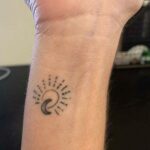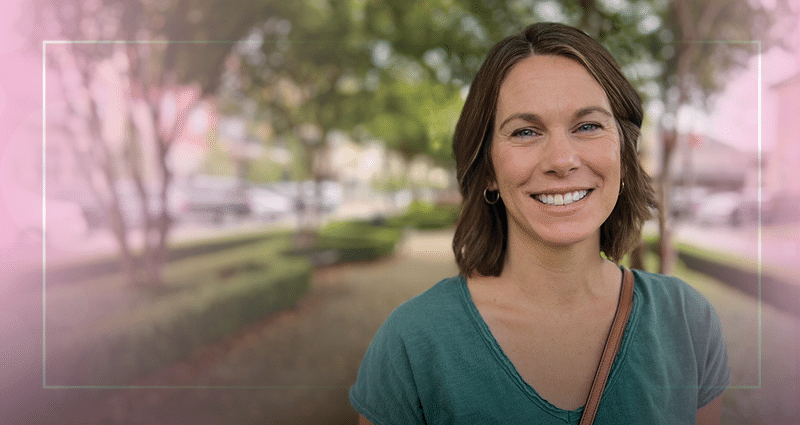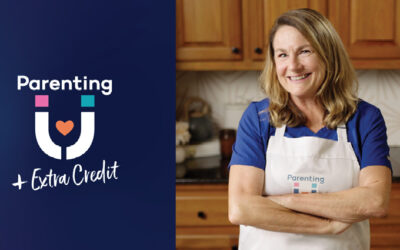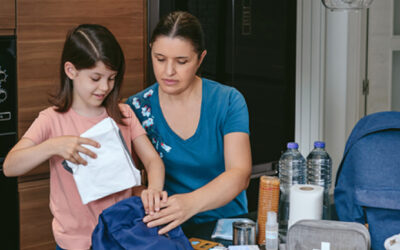Brooke LeBlanc was only 30 years old when she received her breast cancer diagnosis, despite having no family history of the disease.
She was a breastfeeding mom, and her second son was only four months old. She and her family were days away from moving home to Acadiana after living in Colorado for several years. And it was March 2020.
Receiving her care from Our Lady of Lourdes JD Moncus Cancer Center, LeBlanc’s experience and her remarkable recovery have changed her perspective.
Diagnosis
LeBlanc’s doctors in Colorado initially thought the knot she noticed under her left arm was just a clogged milk duct, but additional screening led to the discovery of stage 3 triple negative breast cancer.
“It’s the frustrating type, since we can’t narrow down what it is,” LeBlanc says. She received her diagnosis five days before the family’s move home to Lafayette. She had to immediately wean her nursing child, which she says was harder on her than her infant son.
Experiencing Treatment During the Pandemic
LeBlanc’s treatment plan was developed by her oncologist Joseph E. Brierre, MD, at Our Lady of Lourdes JD Moncus Cancer Center, and it began with four rounds of doxorubicin (Adriamycin), known as “the red devil” because of its bright red color. Then she had 12 rounds of taxol (Paclitaxel). She responded very well to the chemo, and one of the side effects was hair loss so she shaved her head.
Surgery followed, first a mastectomy on her left side where the cancer was found. Six months of radiation followed, and LeBlanc had her final radiation appointment on Christmas Eve 2020.
Her second mastectomy on the right side took place in March 2021, which was almost one year after her initial diagnosis. Jacob Landry, MD, was her surgeon for both mastectomies.
Reconstructive surgery followed. “It made me feel like me again,” LeBlanc says.
Although COVID meant she couldn’t have an in-person celebration, her family and friends put on a parade on the Our Lady of Lourdes campus after she rang the bell and her treatment was complete.
No Evidence of Disease
The plan to move home to Lafayette was all about being closer to family, and LeBlanc’s family, including her husband, Ben, was a major support throughout her treatment.
Luckily, the LeBlancs were already planning to stay with her parents, which gave them additional child care help. “I couldn’t pick up my kids. That was a very hard part of recovery,” she says. “Being back in my mom’s house, having those extra arms and the care was huge.”
One of four children, her siblings and parents were there for her. “The most memorable thing about my treatment was having that support system because that’s really what carried me through,” she says.
 LeBlanc also celebrated the successful end of her treatment by getting a tattoo that she drew in the car after she was told she had “no evidence of disease” or NED. A sun and a moon represent not only strength and calmness but also the initials of her sons, Owen and Cooper.
LeBlanc also celebrated the successful end of her treatment by getting a tattoo that she drew in the car after she was told she had “no evidence of disease” or NED. A sun and a moon represent not only strength and calmness but also the initials of her sons, Owen and Cooper.
Ongoing Follow-up
Her sons are young, 4 and 2, and they don’t remember much about LeBlanc’s illness. “I want to be open with them. They know that mama was sick,” she says. “There’s a chance I could get sick again – always in the back of my head. I take it day by day. Fears creep in, but literally the next day is a new day.”
Regular scans and blood work will remain part of LeBlanc’s life, but she’s glad to have the team at Our Lady of Lourdes on her side. Every six months she has labs done, and those routine checkups may space out if she continues with her NED status. CT scans and ultrasounds are required if there are any concerning results.
Advice for Others: Adopt a Prevention Mentality
LeBlanc was diagnosed so young and with no risk factors, so she wasn’t a candidate for mammograms but she is an advocate for everyone to get regular screenings and perform breast self-exams.
“I’ve been telling my friends I want to do a class for breast exams,” LeBlanc says. “Half of them don’t know how to do them.”
Although COVID shrank the world around her during her breast cancer journey and she had to go to her treatments alone, but LeBlanc was able to process her emotions through journaling and regularly sharing her story on social media.
“My perspective has changed on a lot of things. I came back as an old soul,” she says. “My conversations are different, and I want to have deeper relationships with my friends. Family is even more important to me now.”




